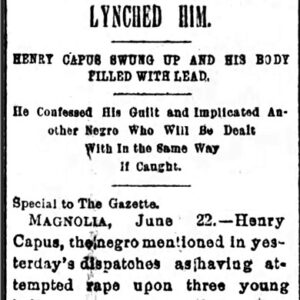calsfoundation@cals.org
Henry Capus (Lynching of)
Henry Capus, an African-American man, was lynched in late June 1894 in Columbia County. The reports regarding his killing are brief and lacking details, but his murder follows the pattern of many other lynchings of the era.
The exact identity of Henry Capus is unknown, as there are no exact census matches for that name (especially given that the enumeration sheets for the 1890 census were lost to fire), and national reports offered variations on his last name, rendering it Cabus or Cahns. There is a Henry Cabos or Cabus listed on the 1880 census residing in Shreveport, Louisiana, but he would have been sixty-four at the time of the lynching. That same census finds a Henry Capus in Alabama; he would have been thirty-six at the time of the murder.
According to dispatches from Magnolia (Columbia County) dated June 21 and June 22, 1894, and published in the Arkansas Gazette, Capus had allegedly “attempted to enter the bed rooms of three different young ladies at their homes in the southern portion of this county.” Apparently, he fled, for he was captured in Homer, Louisiana, and returned to Columbia County to the place where he allegedly committed his acts. After being “fully identified” and confessing to the deed, he “was swung to a limb and about 100 bullets put into his body.” An inquest held over the body returned “a verdict of death at the hands of unknown parties.”
Before dying, Capus allegedly “implicated another negro in the neighborhood,” who was subsequently hunted down. A June 23 dispatch from Magnolia observed that this supposed co-conspirator—left unnamed—had already been captured and was being put on trial; there was some expectation that he might also be lynched, though there are no reports to that effect. At the same time, another African-American man, aged nineteen, had been arrested for the attempted rape of a four-year-old white girl by the last name of Williams, who reportedly informed her mother of the deed. As the Gazette reported, “The child bears no marks of violence, though there is no doubt but that she has spoken truthfully.”
For additional information:
“He Will Be Lynched.” Arkansas Gazette, June 22, 1894, p. 1.
“Lynched Him.” Arkansas Gazette, June 23, 1894, p. 1.
“Will Stretch Hemp.” Arkansas Gazette, June 24, 1894, p. 1.
Staff of the CALS Encyclopedia of Arkansas
 Civil Rights and Social Change
Civil Rights and Social Change Post-Reconstruction through the Gilded Age, 1875 through 1900
Post-Reconstruction through the Gilded Age, 1875 through 1900 Henry Capus Lynching Article
Henry Capus Lynching Article 




Comments
No comments on this entry yet.